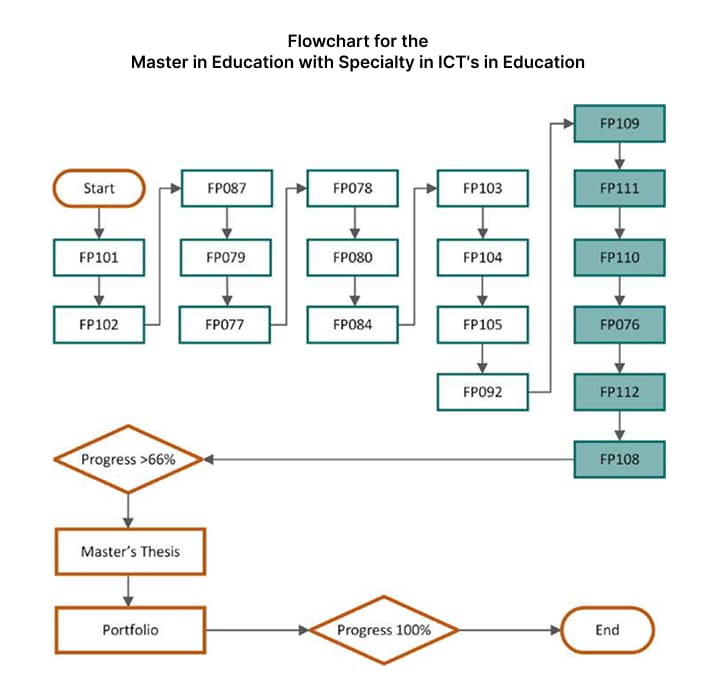
Description
The Master in Education with a specialty in ICT in Education is designed to train teachers so that they can meet the educational challenges posed today by technology-supported teaching across different educational levels. This master’s degree aims to offer specialized, up-to-date, and multidimensional didactic education for the selection, design, and application of information and communication technologies from a perspective where quality, creativity, and innovation in favor of educational improvement can be promoted.
Learning Objectives
Competencies
- Offer comprehensive, up-to-date training, and provide the foundations for the development of academic and professional skills needed for teaching in any of the various teaching and learning contexts that may arise.
- Base professional practice on current knowledge in new or unfamiliar educational settings, provide insights on the nature of teaching and learning in general, and develop the necessary competencies, knowledge, skills, and practical resources to complement this theoretical foundation.
- Stimulate critical thinking for sound theoretical training and its necessary practical application, a fundamental area of action; develop good judgment, good decision-making, and problem-solving skills; and provide scientific research tools for referenced contributions on innovative or current higher education topics.
Outcomes
At the end of the program, students will be able to:
- Analyze the concepts of e-learning and virtual teaching and learning environments, and distinguish the different types of virtual environments.
- Identify the characteristics of teaching and learning in virtual learning environments.
- Plan and evaluate learning processes in virtual environments, considering the teaching and learning context, the methodological approach, and students’ interests, needs, and learning styles.
- Identify and manage the different ICT resources and tools.
- Select and apply the different tools and resources creatively in the design of teaching proposals tailored to the learning context.
- Identify the main ICT-applied learning theories.
- Connect learning theories with the use, selection, organization, and evaluation of ICT.
- Identify the sociocultural theoretical principles that lay the foundation for collaborative learning in a virtual environment.
- Describe and assess technologies that promote collaborative work in virtual teaching and learning environments.
- Identify the theoretical foundations underlying innovative ICT-based educational proposals.
- Design and evaluate proposals ICT-based training proposals.
Who Should Apply
Graduates in any area of knowledge dedicated to or wishing to work in teaching and wanting to receive specific, specialized training in the application of ICT in teaching, the design of programs, subjects, resources, materials, and learning environments, and training actions in the educational (formal and informal) or corporate (editorials, multimedia producers, etc.) fields.
Duration
The program must be completed within 24 months. The following is the credit structure of the Master in Education with a specialty in ICT in Education:
Core subjects: 34 credits
Electives: 13 credits
Required: 13 credits
Students need a minimum of 60 credits.
Structure
| MASTER IN EDUCATION WITH A SPECIALTY IN ICT IN EDUCATION | |||||
|---|---|---|---|---|---|
| CODE | SUBJECT | PREREQUISITE | CREDITS | ||
| CORE SUBJECTS |
|||||
| FP101 | Learning Theories and Methodological Approaches in Education | N/A | 3 | ||
| FP102 | Strategic Learning and Professional Development | N/A | 3 | ||
| FP087 | Learning Factors | N/A | 3 | ||
| FP079 | Tutoring Action in the Education System | N/A | 3 | ||
| FP077 | ICT in Classroom: Education Applications and Use of Resources | N/A | 3 | ||
| FP078 | Interculturality and Education | N/A | 3 | ||
| FP080 | Conflict Solution and Transformation in the Educational Environment | N/A | 3 | ||
| FP084 | Environment Education in Formal Education | N/A | 3 | ||
| FP103 | Fundamentals of Special Education: Processes of Attention to Diversity | N/A | 3 | ||
| FP104 | Organization and Management of Educational Centers | N/A | 3 | ||
| FP092 | Methodology of Scientific Research | N/A | 3 | ||
| FP105 | Portfolio I | N/A | 1 | ||
| ELECTIVES | |||||
| FP109 | ICT in Education and Learning Theories | N/A | 3 | ||
| FP111 | Analysis of Technological Resources and Design of Creative Activities | N/A | 3 | ||
| FP110 | Training in Virtual Learning Environments | N/A | 3 | ||
| FP076 | Collaborative Work in Virtual Environments | N/A | 2 | ||
| FP112 | Design and Evaluation of Training Proposals based on ICT | N/A | 2 | ||
| REQUIRED | THESIS | ||||
| FP108 | Portfolio II | N/A | 1 | ||
| FP116 | Portfolio III | N/A | 2 | ||
| FPEE01 | Master's Final Project | Having completed 50% of the program credits and having passed FP092 | 10 | ||
| TOTAL | 60 | ||||
Diagram

Degree
Once the subjects and master’s thesis are approved and all academic, administrative, and financial requirements have been met, the following degree will be issued:
Master’s Degree in Education with a specialty in ICT in Education